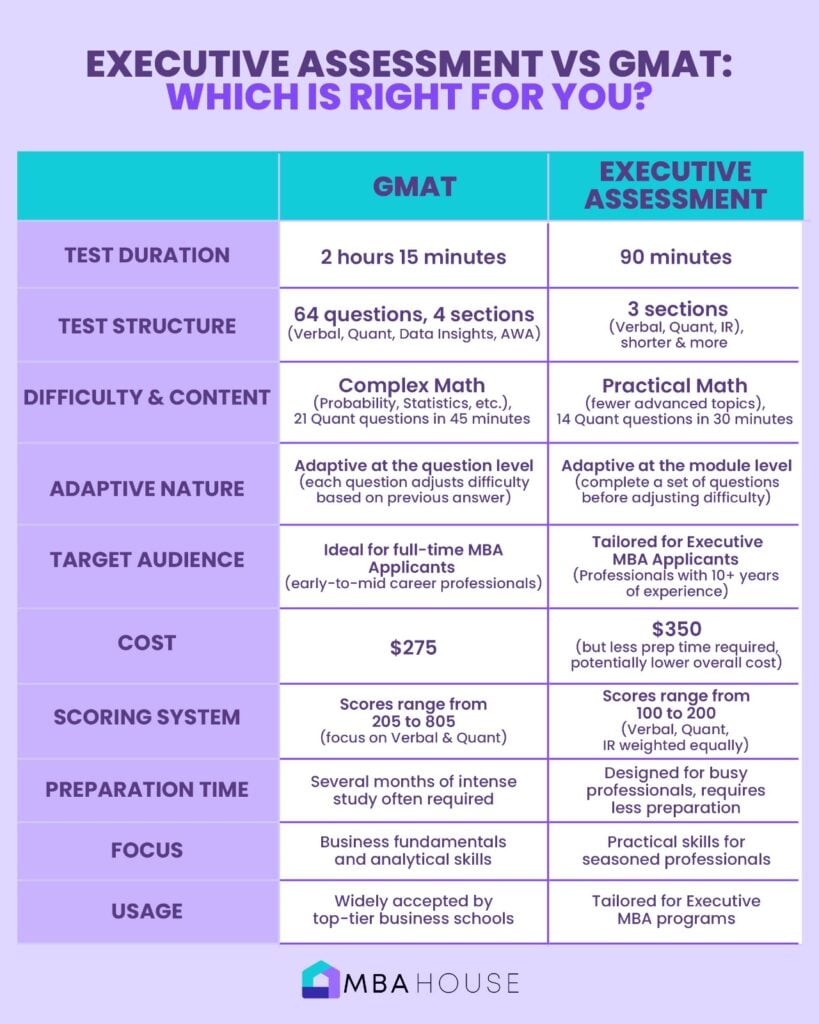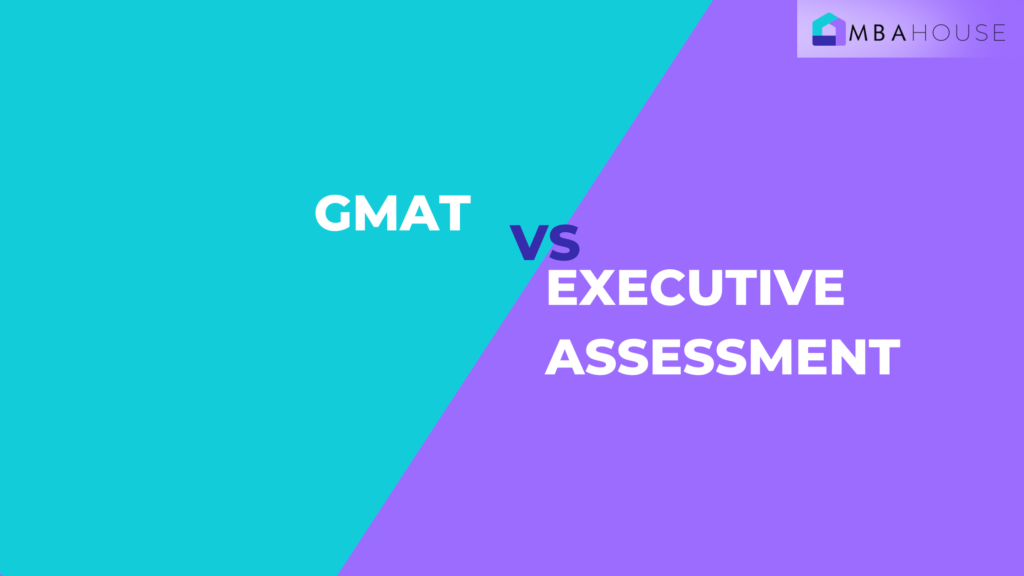If you’re reading this, you’re likely standing at a crossroads in your MBA journey, weighing your options between the GMAT and the Executive Assessment (EA). It’s a question many ambitious professionals grapple with as they navigate their next steps.
Think about your journey so far. You’ve worked hard, gained valuable experience, and now you’re ready to take the next leap in your career. Maybe you’re asking yourself, How is the EA compared to the GMAT? Don’t worry—many feel the same way!
Most MBA programs require standardized test scores to assess your higher-order thinking, problem-solving abilities, and commitment to the program. However, testing requirements can vary widely: some programs waive all testing, others let you choose your preferred test, and some have a clear preference for one exam over another.
So, why do business schools seem to favor the GMAT? And who should consider the Executive Assessment (EA)?
As you explore your options, you’ll find three main tests accepted by MBA programs:
✔️The Graduate Management Admission Test (GMAT)
✔️The Graduate Record Examination (GRE)
✔️The Executive Assessment (EA)
The GMAT has long been the gold standard for MBA admissions, but the EA is quickly carving out its own space, particularly for seasoned professionals. If you’ve been out of school for a while and have a wealth of experience, the Executive Assessment might just be the right fit for you. It’s designed for busy professionals who want to showcase their skills without the pressure of a traditional test format.
In this blog, we’ll explore the key differences in the executive assessment vs GMAT, helping you make an informed decision that aligns with your career goals. Let’s dive in and see which test could be your ticket to the MBA program of your dreams!
GMAT vs EA: Which One Should You Take?
While both tests are created by GMAC, they cater to different applicant profiles and have distinct purposes. Understanding the key differences in their format, content, and intended audience will help you choose the right exam for your MBA goals. Let’s dive in:
What Is the GMAT?
The GMAT, or Graduate Management Admission Test, is the standard exam for applicants to full-time MBA programs. It’s a computer-adaptive test (CAT) that adjusts the difficulty of each question based on your previous answers. The GMAT is designed to test critical thinking, reasoning, problem-solving, and data interpretation—skills essential for success in business school and beyond. Over 200,000 people take the GMAT each year, aiming to gain admission to prestigious MBA programs worldwide.
What Is the Executive Assessment?
The Executive Assessment (EA) is a newer, more streamlined version of the GMAT, created in 2016 to accommodate experienced working professionals aiming for Executive MBA (EMBA) programs. The EA, often referred to as the “mini GMAT,” tests similar skills as the GMAT but in a shorter, less intense format. While the GMAT is designed for early-career professionals, the EA is geared toward experienced managers looking to advance to senior leadership roles through an EMBA.
Key Similarities Between Executive Assessment vs GMAT
Even though the GMAT and the EA cater to different groups, they do share a few key similarities that make them valuable tools for assessing your readiness for business school.
- Content Areas: Both exams test similar core areas – verbal reasoning, quantitative reasoning, and integrated reasoning – ensuring that both options help schools evaluate your critical thinking and analytical abilities.
- Computer-Adaptive Format: The GMAT and EA both adjust their difficulty based on your answers. This means that, in both cases, how well you perform in the earlier questions influences how tough the later questions get.
- Administered by GMAC: Both tests are created and administered by the Graduate Management Admission Council (GMAC), ensuring that both tests adhere to the same high standards and consistency.
- Validity for 5 Years: Once you take either exam, your scores are valid for five years, giving you plenty of time to apply for business schools that match your career goals.
Executive Assessment Test vs GMAT: Key Differences

1. Test Duration and Structure
- GMAT: The GMAT lasts about 2 hours and 15 minutes, excluding an optional 10-minute break. It consists of 64 questions spread across four sections: Verbal Reasoning, Quantitative Reasoning, Data Insights, and an Analytical Writing Assessment (AWA).
- Executive Assessment: The EA is much shorter, taking only 90 minutes to complete. It includes three sections—Verbal Reasoning, Quantitative Reasoning, and Integrated Reasoning (IR)—with no AWA section. Each section lasts 30 minutes, making it a quicker option for busy professionals.
2. Difficulty and Content
The GMAT and EA both test verbal and quantitative reasoning, but the level of difficulty and the number of questions differ significantly.
Is the Executive Assessment easier than the GMAT? In many ways, yes. The EA features fewer, less complex math questions and focuses on practical problem-solving, making it a more approachable option for seasoned professionals who may feel out of touch with academic test prep.
- GMAT Quantitative Section: The GMAT’s Quant section includes more complex math topics like probability, statistics, and combinatorics. It has 21 questions that must be answered in 45 minutes.
- Executive Assessment Quantitative Section: The EA’s Quant section, on the other hand, features only 14 questions in 30 minutes. The math on the EA is generally less challenging, focusing more on basic concepts that a business professional would encounter in the workplace. Advanced math topics appear less frequently on the EA, making it more approachable for test-takers with less confidence in their math skills.
3. Adaptivity of the Exam
Both exams are adaptive but function differently:
- GMAT: The GMAT is adaptive at the question level, meaning that each question you answer influences the difficulty of the next one. If you answer a question correctly, the next question will be more challenging. If you get it wrong, the next question will be easier.
- Executive Assessment: The EA is adaptive at the module level. After completing a group (module) of questions, your performance determines the difficulty of the next module. This system allows you to review and edit your answers before moving on to the next module, giving you more flexibility than the GMAT.
4. Test Focus and Audience
- GMAT: The GMAT is aimed at individuals applying for full-time MBA programs. These are typically early to mid-career professionals who are looking to develop their business acumen and leadership skills for career advancement. The GMAT is often seen as more challenging because of the length and complexity of the exam, requiring significant preparation time.
- Executive Assessment: The EA is specifically tailored to working professionals with 10+ years of experience who are applying to Executive MBA programs. The shorter, more practical nature of the EA makes it ideal for individuals with established careers who are looking for a flexible, less time-consuming test option.
5. Cost
As of 2024, the cost of the Executive Assessment is $350, while the GMAT costs $275. Although the EA is more expensive upfront, it often requires less preparation time and fewer resources, such as tutoring or prep courses, compared to the GMAT. This can make the EA a more cost-effective option for working professionals.
6. Scoring System
The scoring systems for the GMAT and EA differ in important ways:
- GMAT: The GMAT scores range from 205 to 805, with separate scores for each section (Verbal, Quant, and Data Insights) contributing to the total score. The focus is primarily on the Verbal and Quantitative sections.
- Executive Assessment: EA scores range from 100 to 200, and each of the three sections (Verbal, Quant, and Integrated Reasoning) is weighted equally. A score of 150-155 is considered good, but a score above 155 can strengthen your application to top-tier EMBA programs.
7. Preparation Time
The amount of prep required for each test is one of the most significant differences between the two:
- GMAT: The GMAT requires extensive preparation, with many test-takers studying to achieve a competitive score for several months. This typically includes self-study with an effective GMAT study plan, attending prep courses, or hiring a tutor.
- Executive Assessment: The EA is designed for individuals who have less time to dedicate to test prep due to their work commitments. While still requiring preparation, many find that the EA requires less study time than the GMAT. Nevertheless, professional tutoring for the EA is still advisable for those aiming for top scores.
Executive Assessment Prep: How to Approach It
When preparing for the EA, the goal is not to memorize formulas or concepts, but rather to demonstrate practical problem-solving skills relevant to business management. Since the Executive Assessment prep involves fewer advanced math topics, it’s crucial to focus on areas that showcase your ability to analyze data and make informed business decisions.
Here are a few key strategies:
- Understand the Format: Familiarize yourself with the structure of the test and the types of questions you’ll face. Each section—Verbal, Quant, and IR—requires different strategies, so allocate your study time accordingly.
- Practice Efficiently: Since the EA is shorter and focuses more on real-world applications, practice tests can help you identify areas where you need to improve. Time yourself to get used to the 90-minute format and learn how to work efficiently under time pressure.
- Focus on Business-Relevant Concepts: The EA is designed for experienced professionals, so prioritize studying concepts that are directly applicable to business situations. This includes practicing data interpretation, critical reasoning, and decision-making under time constraints.
Reflexiones finales
Deciding between the GMAT and the Executive Assessment (EA) really depends on where you are in your career and what type of MBA program you’re aiming for. If you’re targeting a full-time MBA at a top-tier school, the GMAT is probably your best bet. It’s the go-to test for most traditional MBA programs, and schools typically expect GMAT scores as part of your application.
But if you’ve got a decade or more of work experience and are looking to boost your career with an Executive MBA, the EA is likely the smarter choice. It’s shorter, more focused on real-world skills, and easier to prep for if you’re already juggling a busy career.
Whichever path you choose, it’s essential to align your test choice with your career goals and set yourself up for success in both your academic and professional pursuits. Whether you lean towards the GMAT for its business focus or the EA for its practical, time-saving approach, both tests offer strategies and resources to help you excel. If you’re unsure which test suits you best, consider taking a practice exam to gauge your readiness and get tailored feedback.
For personalized insights and expert guidance, reach out to us at [email protected]. Since 2010, MBA HOUSE’s Ivy-league trained Tutors and Consultants have helped over 2,000 students gain admission into top business schools worldwide, securing more than $50 million in scholarship awards. With unlimited private tutoring, 50 hours of live classes, and supportive e-learning, MBA HOUSE can help fast-track your journey to success in business school.
Connect with us today, and let’s maximize your chances of admission to your dream MBA program!





Redes sociales